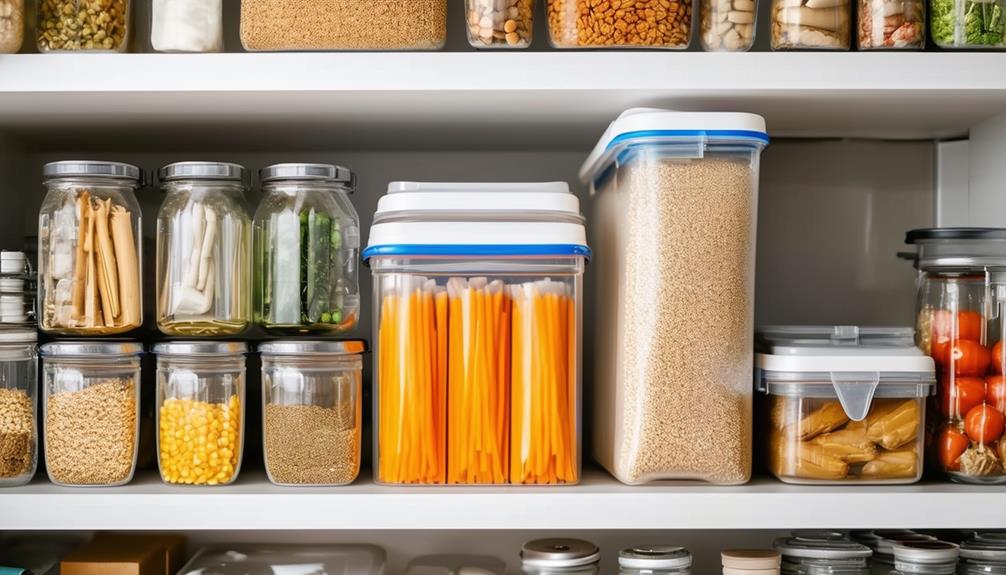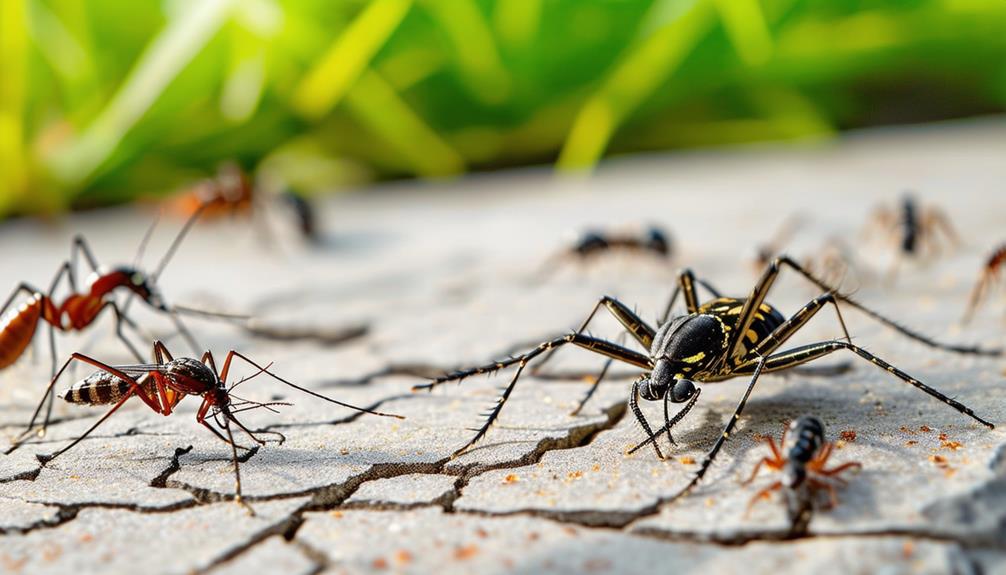When it comes to safeguarding your stored food from pesky intruders in Utah, mastering the art of proper food storage techniques is essential. From utilizing airtight containers to keeping food items elevated, there are specific strategies that can deter unwanted guests. However, there is one vital aspect that often gets overlooked, and it might just be the missing link in your pest prevention arsenal. By honing in on this key element, you can greatly enhance your efforts in maintaining a pest-free environment. Stay tuned to uncover this essential tactic for effective food storage that will keep pests at bay in Utah.
Key Takeaways
- Use airtight containers to deter pests and maintain freshness.
- Elevate food storage to prevent pest access and contamination.
- Promptly clean spills to avoid attracting ants, roaches, and rodents.
- Regularly inspect for expired items to prevent pest infestations.
- Implement Integrated Pest Management strategies for a pest-free environment.
Importance of Proper Food Storage
Properly storing food is essential in Utah to prevent pests like ants, rodents, and cockroaches from invading your home. When it comes to food storage, using airtight containers is vital in deterring pests and insects from infiltrating your living spaces. By storing food items in sealed containers, you reduce the risk of attracting unwanted visitors like spiders and termites, common pests in Utah.
Effective food storage practices not only help in keeping your food fresh but also play a significant role in maintaining a pest-free environment. It's important to uphold cleanliness in food storage areas as any spills or crumbs can easily attract pests looking for a meal. Regularly inspecting stored food for any signs of pests is key to early detection and prevention of infestations in Utah.
Airtight Containers for Food Preservation
When storing food in Utah to prevent pests, utilizing airtight containers is essential for preserving freshness and deterring insects and rodents from accessing your stored goods. Airtight containers help prevent pests like ants, rodents, and cockroaches from reaching your food supplies. By sealing food in these containers, you maintain freshness and extend shelf life by keeping out moisture and air that can lead to spoilage.
Specifically for pantry items such as grains and legumes, airtight containers are vital to deterring pests in Utah. Beetles and weevils are less likely to be attracted to your stored food if it's properly sealed in airtight containers. Ensuring your containers are tightly sealed is key to protecting your food from contamination and spoilage caused by pests in Utah. Invest in airtight containers to prevent pests and keep your stored food safe and fresh for longer periods.
Sealing Food Items Off the Ground
Elevate your food storage containers off the ground to effectively prevent pests like rodents and insects from accessing your stored goods. By keeping your food items off the ground, you create a barrier that reduces the risk of contamination and infestation in your storage space. Utilizing shelving units or platforms is a practical way to achieve this elevation, safeguarding your food supplies from moisture and pests that may be present at ground level.
Elevated storage not only protects your food from unwanted intruders but also makes it easier to inspect for any signs of pest activity. This proactive approach enables you to detect issues promptly and take necessary preventive measures. Additionally, maintaining your food items off the ground enhances the overall organization of your storage space, making it easier to access and manage your stored goods efficiently. Prioritizing this simple yet effective practice can greatly contribute to a pest-free storage environment in Utah.
Prompt Spill Cleanup for Pest Prevention
When it comes to keeping pests at bay, quick spill response and efficient cleaning methods are your best allies. Promptly cleaning up spills not only eliminates a potential food source for pests but also prevents odors that attract them to your living space.
Quick Spill Response
To effectively prevent pests from being attracted to your home, it's essential to promptly clean up spills, particularly those containing sugary or sticky substances. Quick spill response is vital in avoiding pest infestations.
Make sure to wipe up spills immediately, especially in areas where food is stored or prepared. Check and clean spots prone to spills like kitchen counters, floors, and dining areas regularly.
Properly disposing of food scraps and leftovers also helps in keeping pests at bay. By adopting good habits for quick spill cleanup, you can greatly reduce the risk of attracting pests like ants, roaches, and rodents into your Utah home.
Stay vigilant and proactive in maintaining a clean environment to deter unwanted intruders.
Efficient Cleaning Methods
To maintain a pest-free environment in your Utah home, keeping up with efficient cleaning methods, especially prompt spill cleanup, is essential. Here are some tips to help you prevent attracting pests like ants and cockroaches:
- Immediate Cleanup: Food spills should be promptly wiped and cleaned to avoid providing a food source for pests.
- Regular Maintenance: Regularly vacuuming and mopping floors can help eliminate crumbs and spills that may attract pests.
- Proper Storage: Storing food in airtight containers can prevent spills and leaks that could attract pests.
Regular Inspection for Expired Items
Regularly inspecting your food storage areas for expired items is vital in preventing pests from being attracted to your home. By checking for expired food regularly, you can eliminate potential food sources that may draw pests into your living space.
Dispose of expired items promptly to make sure that pests don't find their way into your pantry or storage areas. It's important to examine food containers for any signs of spoilage or expiration dates to maintain a pest-free environment.
Implementing a schedule for routine inspections will help you stay on top of removing expired items in a timely manner. Monitoring and promptly discarding expired food items play a significant role in preventing pest infestations in your home.
Minimizing Risk of Pest Infestations
To minimize the risk of pest infestations, guarantee proper food storage by sealing containers tightly and maintaining a regular cleaning routine.
These practices help eliminate food sources and hiding spots for pests, reducing the likelihood of infestations in your home.
Proper Food Storage
Ensuring food is stored in airtight containers is essential for minimizing the risk of pest infestations in Utah. When it comes to proper food storage, consider the following:
- Utilize airtight containers: Opt for containers that seal tightly to prevent pests from accessing stored food.
- Protect against air and moisture: Choose containers that offer protection against air and moisture, as these conditions can attract pests.
- Keep storage areas clean and organized: Reduce hiding spots for pests like ants and rodents by maintaining cleanliness and order in your food storage areas.
Seal Containers Tightly
How important is it to make sure containers are tightly sealed to effectively minimize the risk of pest infestations in Utah?
Properly sealed containers play a vital role in preventing pests like ants, rodents, and cockroaches from accessing stored food. By utilizing airtight food packaging, you create a barrier that deters pests and reduces the chances of contamination and spoilage.
Sealing containers tightly not only safeguards the quality and freshness of the stored food but also limits access points that pests could use to infiltrate storage areas. Maintaining a tight seal on containers is a key strategy to keep pests away from seeking out food sources in Utah.
Regular Cleaning Routine
Regularly cleaning your kitchen surfaces, floors, and food storage areas is essential in minimizing the risk of pest infestations. To maintain a pest-free environment, follow these important steps as part of your regular cleaning routine:
- Eliminate Food Residue: Wipe down kitchen surfaces and floors to remove any food particles that may attract pests.
- Use Airtight Containers: Store food in sealed containers to prevent pests from accessing and contaminating your supplies.
- Secure Garbage Disposal: Promptly dispose of garbage in sealed bins to deter pests like rodents and insects from invading your space.
Hygienic Living Environment Maintenance
To maintain a hygienic living environment, it's essential to consistently clean and declutter your living space to eliminate potential hiding spots for pests like ants, spiders, and rodents. Regularly cleaning and organizing your surroundings not only create an inhospitable environment for pests but also help in early detection of any signs of infestation.
Ensuring that cracks and crevices in walls, floors, and windows are sealed can prevent pests from finding their way into your home. Additionally, storing food in airtight containers is vital for avoiding attracting pests like cockroaches, ants, and rodents.
Conducting routine indoor and outdoor inspections will enable you to promptly address any pest-related issues that may arise. For long-term prevention, consider seeking professional pest control assistance for regular treatments and preventive measures. By following these practices, you can uphold a clean and pest-free living environment in your Utah home.
Best Practices for Storing Food
Maintaining a hygienic living environment involves proper storage techniques to prevent pests from contaminating your food. When it comes to storing food effectively, consider the following best practices:
- Utilize Airtight Containers: Store your food in airtight containers to prevent pests like ants, rodents, and cockroaches from accessing and contaminating it. This not only helps in keeping pests at bay but also extends the shelf life of your food items.
- Regular Cleaning and Decluttering: Make sure to regularly clean and declutter your storage areas. By eliminating hiding spots for pests, you can greatly reduce the risk of infestations in your stored food. A clean environment is essential for maintaining the freshness and quality of your stored food.
- Sealing Techniques: Implement sealing techniques such as caulking cracks and installing screens on windows and doors to prevent pests from entering your storage areas. These measures can help in safeguarding your food and preserving its shelf life effectively.
Pest Avoidance Through Food Storage
When storing food to avoid pests in Utah, one essential strategy is to utilize airtight containers. Airtight containers help prevent pests like ants, rodents, and cockroaches from infesting stored food, especially in long-term storage.
It's vital to regularly inspect and clean food storage areas to reduce the risk of attracting pests such as spiders, mosquitoes, and boxelder bugs. Sealing entry points with caulk and installing screens on windows and doors can also deter pests from entering food storage areas, aiding in long-term pest avoidance.
Implementing Integrated Pest Management (IPM) strategies is another key step to help control pests while minimizing the use of harmful chemicals in food storage spaces. By maintaining cleanliness, staying vigilant with inspections, and seeking professional assistance when needed, you can effectively prevent pests from infesting your stored food items, ensuring long-term protection for your supplies.
Utah-Specific Food Storage Tips
When storing food in Utah, remember to:
- Seal food containers tightly
- Use airtight bags
- Store items in cool areas
These practices help prevent pests like ants, rodents, and cockroaches from infiltrating your food supplies. By following these simple tips, you can maintain a pest-free pantry in Utah.
Seal Food Containers
To safeguard your stored food from pests like ants, rodents, and cockroaches in Utah, make sure you seal your food containers tightly with airtight lids. Here are some essential tips for sealing food containers effectively:
- Choose Airtight Containers: Opt for containers with secure, locking lids to prevent pests from infiltrating your stored food.
- Inspect for Gaps: Regularly check containers for any gaps or openings that pests could use to access the contents.
- Utilize Sealable Bags: For smaller items or loose foods, consider using sealable bags within containers for an extra layer of protection against pests.
Use Airtight Bags
For effective protection against pests in Utah, make sure to utilize airtight bags when storing your food supplies. Airtight bags serve as an essential barrier against common pests like ants, rodents, and cockroaches, helping to maintain the freshness of stored food while preventing contamination. These bags create a seal that keeps out insects, reducing the risk of infestations by pests prevalent in Utah, such as boxelder bugs and termites. Investing in high-quality airtight bags is a practical and cost-effective way to safeguard your food from Utah's diverse pest population. Consider the following table for a quick overview:
| Benefits of Using Airtight Bags for Storing Food in Utah |
|---|
| Maintains freshness of food |
| Prevents contamination from pests |
| Creates a barrier against common pests |
| Reduces the risk of infestations |
Store in Cool Areas
Consider storing your food in cooler areas to deter common pests and maintain freshness in Utah's varying climate conditions. Here's why cool storage is important in preventing infestations and preserving your food supplies in Utah:
- Pest Deterrence: Cool storage areas inhibit pest activity, keeping ants, cockroaches, rodents, spiders, boxelder bugs, termites, and mosquitoes at bay.
- Freshness Maintenance: Properly sealed and stored food in cool spots helps in maintaining the freshness of your supplies, especially in Utah's fluctuating climate.
- Risk Reduction: By following Utah-specific food storage tips like storing in cool areas, you greatly decrease the chances of attracting pests and facing infestations, ensuring your food remains safe for consumption.
Frequently Asked Questions
How Do You Store Food to Prevent Pests?
To keep pests away, store food properly. Use airtight containers to block ants, rodents, and cockroaches. Keep food off the floor and walls, inspect it regularly, and clean storage areas to avoid attracting pests.
What Is the Best Way to Protect Food Storage Areas?
To safeguard food storage areas effectively, maintain consistent temperature control. Store food in airtight containers to prevent pests. Regularly inspect and clean storage spaces. Implement Integrated Pest Management for eco-friendly solutions. Avoid broad-spectrum pesticides.
When Storing Food What Is the Best Way to Prevent?
When storing food, the best way to prevent pests is by using airtight containers, cleaning spills promptly, storing food off the floor, inspecting storage areas regularly for signs of pests, and using pest-resistant materials for storage.
Can Bugs Get Into Mylar Bags?
When bugs try to sneak into Mylar bags, they hit a brick wall. These bags seal tight, keep pests out. A fortress for your food; bugs can't crash this party.



